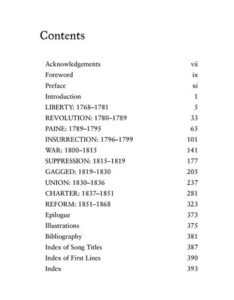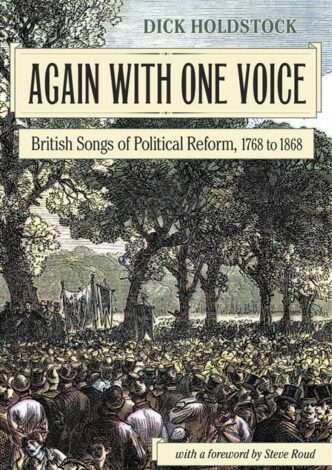This ‘supremely singable’ collection of 120 songs with musical settings should ‘enlighten and enliven our discussions and our singing in equal measure’
(Oskar Cox Jensen, Historian, UEA)
At the heart of ‘Again with One Voice’ are the words and melodies of a remarkable collection of one hundred and twenty British songs from the turbulent hundred years that culminated with the Second Reform Act of 1868. The collection charts a century of working-class struggle for democracy and political reform and brings to life important movements and people, like Wilkes and Liberty, the anti-slavery movement, Luddites, Captain Swing, and Chartists.
The songs ‘have an energy and commitment fuelled by anger, despair, humour and wit’; and open a way of meeting ‘the ancestors who fought and improved our lives’ (Frankie Armstrong, Godmother of the Natural Voice Singing Movement).
The book’s chronological structure ‘gives the reader a sense of how this fascinating era unfolded and the introductions to each chapter provide an overarching narrative, invaluable to the reader who may be unfamiliar with this period.’ Including the ‘tunes to all of the songs is a real strength’. (Alison Morgan, in Folk Music Journal).
This was the Golden Age of the broadside ballad, the inexpensive songsheets sold on the street, at a time when almost everybody sang – and sang a great deal. Oral tradition was especially effective for the common people, but printed material helped a song’s circulation. A shocking event, such as the Peterloo massacre, could be reported quickly and effectively.
When tavern-goers sang of the good life, temperance societies about the drunkard’s road to ruin, conservatives of patriotism, and religious groups about the glories of the Lord, song was a glue that kept a community together, enhancing solidarity and cohesion in performance. Street performers included songs promoting radical reform of an archaic political system, still controlled by landed aristocrats.
History may be written by the victors, but songs tell a different story. They ‘shine a new spotlight on people’s everyday lives’ and helped to bring home the lived experience, the excitement and commitment to a social and political movement: ‘Every inch of progress was partly achieved, or at least accompanied by, vocal dissent, agitation, protest, against powerful forces which could turn brutal’ (Steve Roud).
Thirty years in the making, this unique collection was gathered by civil rights activist, performer and author Dick Holdstock. A veteran campaigner, Holdstock’s credits include joining ‘Martin Luther King on the March from Selma to Montgomery, Alabama’, and many substantial campaign involvements since. His comments on this collection incorporate contributions and insights from numerous academics, librarians, folkies and performers. These songs ‘all spoke of workers’ lives and their growing commitment to amending the class-dividing political system’ and motivated British workers to achieve political reform.
They “revealed the complex sentiments of working people who became more and more resolved to obtain a truly representative government. Evident in these lyrics were the depths of humiliation, strife, and hardship suffered by the working class of Britain… These were more than just political poems; they were all part of a singing tradition, and singing these songs today can bring us closer to those who wrote them.” (Dick Holdstock)
Each of the ten chronological chapters begins with a succinct but informative historical introduction. The following excerpt illustrates how such times still resonate today:
Following the Napoleonic wars, working class discontent was manifest throughout all of Britain. Realizing the enduring needs for decent housing, safe water, better working conditions, lower food prices, fair pay, lower taxes, equal justice, and the right to vote, the large working class knew that it had gained nothing from twenty-two years of war. Many felt that they could have been better off if Napoleon had won, which might have ended their unbearable lives controlled by Britain’s aristocracy. p.177
Similarly, with the songs, like in ‘The Tradesmens’ Complaint’, set in the 1819 trade depression:
If you go to a shop and ask for a job,
The answer is no with a shake of the nob,
‘Tis enough to make a man turn to and rob
Oh! the dead time of Old England, &c. p.200.
I noticed an emotional impact imprinted by the songs, after a mere reading, even without the actual singing that this songbook facilitates.
Dick Holdstock explains,
“Following each song is my commentary, shedding light on the context, feeling, intent, and circumstances of the song, as we understand it today.”
He has taken care to indicate any adaptations, seeking to preserve the original wherever possible.
Holdstock’s song collection traces the history of this tumultuous period and will be of interest to historians and singers alike. What stands out to me, however, are the moments of insight this material provides. As Alison Morgan noted, in Folk Music Journal, Holdstock has correctly identified the importance of giving voice to history’s ‘marginalised and often overlooked witnesses’. Further, ‘the collection provides compelling evidence of the role played by ballads and balladeers, singers, musicians, and audiences in political reform.’
This book review is by Steven Carter.

Note: Sample material is available on the Amazon website.

Rosie C
Very interesting. Songs were important also because most people could not read. Singing the words of political songs was an excellent way of spreading news and uniting people.